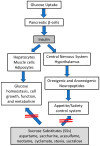Could Insulin Be a Better Regulator of Appetite/Satiety Balance and Body Weight Maintenance in Response to Glucose Exposure Compared to Sucrose Substitutes? Unraveling Current Knowledge and Searching for More Appropriate Choices
- PMID: 38921683
- PMCID: PMC11205552
- DOI: 10.3390/medsci12020029
Could Insulin Be a Better Regulator of Appetite/Satiety Balance and Body Weight Maintenance in Response to Glucose Exposure Compared to Sucrose Substitutes? Unraveling Current Knowledge and Searching for More Appropriate Choices
Abstract
Background: Insulin exerts a crucial impact on glucose control, cellular growing, function, and metabolism. It is partially modulated by nutrients, especially as a response to the intake of foods, including carbohydrates. Moreover, insulin can exert an anorexigenic effect when inserted into the hypothalamus of the brain, in which a complex network of an appetite/hunger control system occurs. The current literature review aims at thoroughly summarizing and scrutinizing whether insulin release in response to glucose exposure may be a better choice to control body weight gain and related diseases compared to the use of sucrose substitutes (SSs) in combination with a long-term, well-balanced diet.
Methods: This is a comprehensive literature review, which was performed through searching in-depth for the most accurate scientific databases and applying effective and relevant keywords.
Results: The insulin action can be inserted into the hypothalamic orexigenic/anorexigenic complex system, activating several anorexigenic peptides, increasing the hedonic aspect of food intake, and effectively controlling the human body weight. In contrast, SSs appear not to affect the orexigenic/anorexigenic complex system, resulting in more cases of uncontrolled body weight maintenance while also increasing the risk of developing related diseases.
Conclusions: Most evidence, mainly derived from in vitro and in vivo animal studies, has reinforced the insulin anorexigenic action in the hypothalamus of the brain. Simultaneously, most available clinical studies showed that SSs during a well-balanced diet either maintain or even increase body weight, which may indirectly be ascribed to the fact that they cannot cover the hedonic aspect of food intake. However, there is a strong demand for long-term longitudinal surveys to effectively specify the impact of SSs on human metabolic health.
Keywords: acesulfame; anorexigenic peptides; aspartame; body weight; hypothalamus; insulin; non-nutritive sweeteners; orexigenic peptides; saccharin; stevia.
Conflict of interest statement
The authors declare no conflicts of interest.
Figures





Similar articles
-
Effects of aspartame-, monk fruit-, stevia- and sucrose-sweetened beverages on postprandial glucose, insulin and energy intake.Int J Obes (Lond). 2017 Mar;41(3):450-457. doi: 10.1038/ijo.2016.225. Epub 2016 Dec 13. Int J Obes (Lond). 2017. PMID: 27956737 Clinical Trial.
-
Effects of exercise intensity on plasma concentrations of appetite-regulating hormones: Potential mechanisms.Appetite. 2016 Mar 1;98:80-8. doi: 10.1016/j.appet.2015.12.016. Epub 2015 Dec 22. Appetite. 2016. PMID: 26721721 Review.
-
A randomized controlled trial contrasting the effects of 4 low-calorie sweeteners and sucrose on body weight in adults with overweight or obesity.Am J Clin Nutr. 2019 May 1;109(5):1288-1301. doi: 10.1093/ajcn/nqy381. Am J Clin Nutr. 2019. PMID: 30997499 Clinical Trial.
-
Acute administration of capsaicin increases resting energy expenditure in young obese subjects without affecting energy intake, appetite, and circulating levels of orexigenic/anorexigenic peptides.Nutr Res. 2018 Apr;52:71-79. doi: 10.1016/j.nutres.2018.02.002. Epub 2018 Feb 10. Nutr Res. 2018. PMID: 29530622 Clinical Trial.
-
Effects of Nesfatin-1 on Food Intake and Hyperglycemia.J Am Coll Nutr. 2020 May-Jun;39(4):345-351. doi: 10.1080/07315724.2019.1646678. Epub 2019 Aug 1. J Am Coll Nutr. 2020. PMID: 31369353 Review.
Cited by
-
Gestational saccharin consumption disrupts gut-brain axis glucose homeostasis control in adolescent offspring rats in a sex-dependent manner.Biol Sex Differ. 2025 Jun 16;16(1):43. doi: 10.1186/s13293-025-00724-5. Biol Sex Differ. 2025. PMID: 40524248 Free PMC article.
References
Publication types
MeSH terms
Substances
LinkOut - more resources
Full Text Sources
Medical

